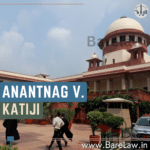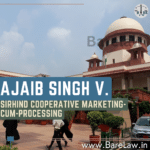
Table of Contents
Rajesh Kanta Roy v. Shanti Debi (AIR 1957 SC 255 : 1957 SCR 77 | BareLaw
Shanti Debi, the respondent in the case of Rajesh Kanta Roy v. Shanti Debi (AIR 1957 SC 255: 1957 SCR 77) is a significant legal issue that relates to family conflicts, endowed property and decree enforcement. This is an important judgment from the Supreme Court of India which goes deep into trust law intricacies as well as family property rights.
Background and Parties Involved The dispute was amongst Ramani Kanta Roy’s family who had substantial properties with three sons namely Rajes Kanta Roy, Rabindra Kanta Roy and Ramendra Kanta Roy. For his deity, Ramani had created an endowment naming his sons as shebaits. Upon the death of Rabindra, Shanti Debi, his widow claimed to be a co-shebait thereby leading to some legal battles and compromises.
The Legal Dispute The main question in this case was on executing a compromise decree dated back in 1946. In a previous compromise, Shanti Debi waived her rights but agreed to collect monthly allowance as compensation for it. She sought to enforce the decree after defaulting this payment when it fell into arrears. It is this execution which was at the centre stage in Supreme Court appeal.
Main Contentions There were two major legal points in this case; one was whether Shanti Debi could straightaway seek personal remedy against default or she should first exhaust her remedies through charge on certain properties provided by the compromise decree. Thus there arose issues regarding how compromise agreements might be interpreted and given effect within settings concerning land disputes
The second contention dealt with nature of Rajes’s interests in the properties subject matter of trust deed executed by his father. He maintained that his interest was merely one of trusteeship making it non-attachable in such execution proceedings thus reviving distinction between vested and contingent interests under Property Law.
Legal Analysis and Implications This is because the case has a detailed analysis of how compromise decrees are interpreted and executed in the Indian legal system. The judgment examines issues of property rights, particularly in relation to religious endowments and family trusts. It also brings to light some of the complexities that arise when executing decrees especially where they contain numerous agreements with time stipulated.
Conclusion Rajesh Kanta Roy v. Shanti Debi is a landmark decision in Indian jurisprudence that explores various aspects of trust law, property rights, and execution of judicial contracts. It serves as a precedent for similar cases involving family disputes over property and interpretation of trust deeds. This case highlights the importance of clear legal documents and well-drafted compromises in family disputes over inheritance.
Summary:
This article considers Rajesh Kanta Roy v. Shanti Debi, a significant verdict by India’s Supreme Court. Evidence pertaining to the family conflict from which this lawsuit arose unfolds before us; its main legal contentions on how best to execute a compulsion decree are also unveiled as well as identifications on what constitutes interest under trust deed. As such, this case study offers valuable insights into the complexities involved in Indian property law, trust law and execution of judicial contracts.





